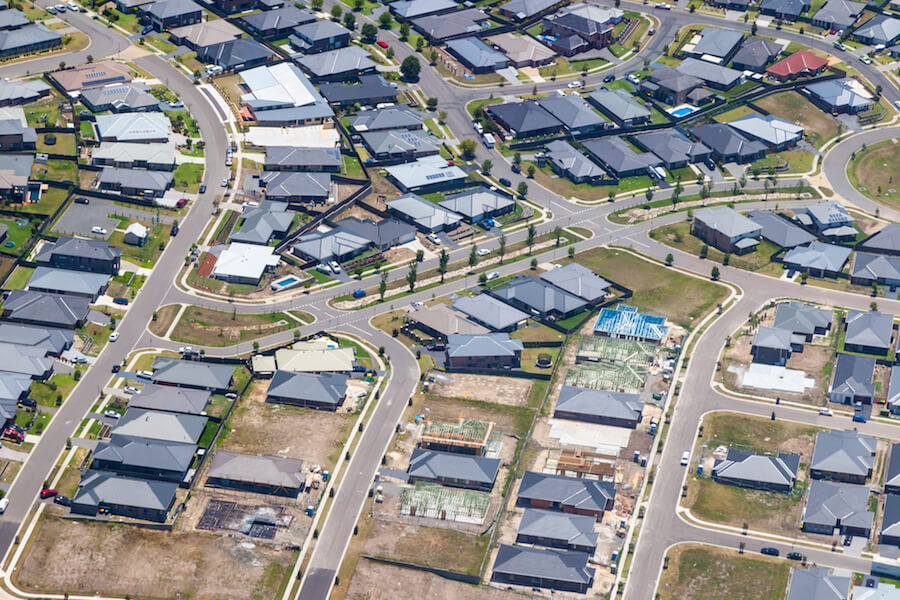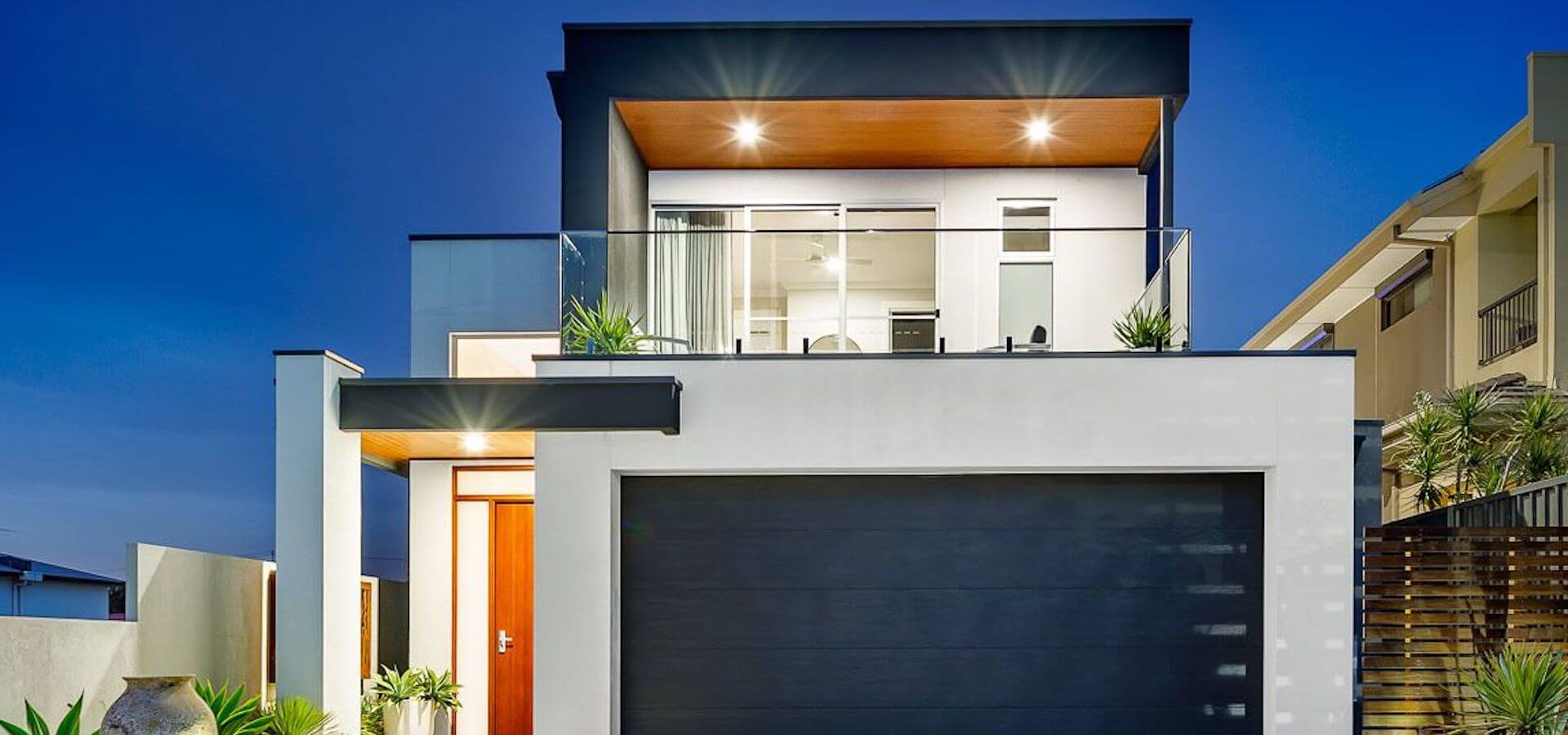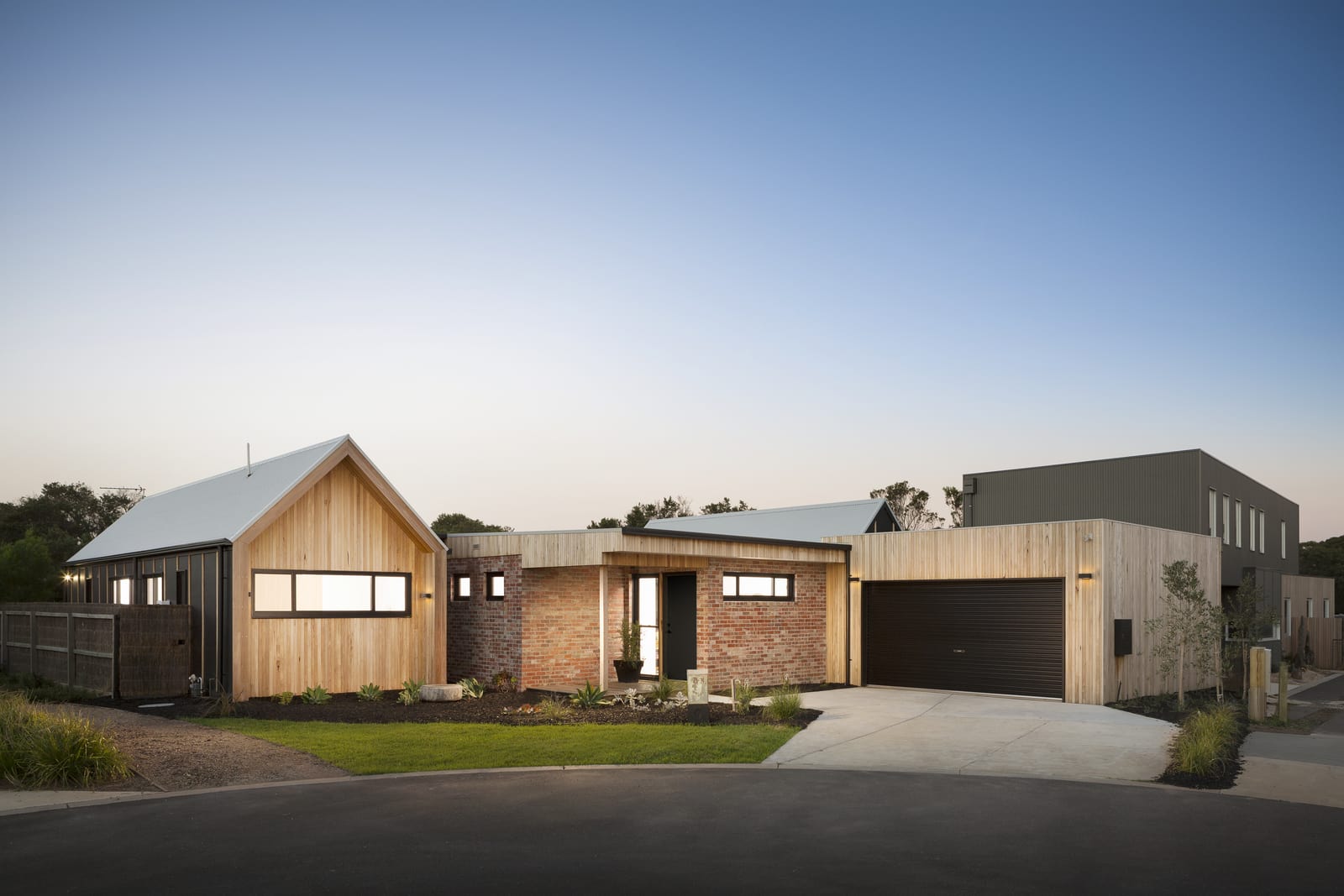Buying land to build on is an exciting task, but can be daunting if you’ve never done it before. From choosing a location to understanding builder’s and lender’s jargon, there are lots of considerations to make before purchasing your land.
Whether you’re in the initial stage of trying to find land to build on or are ready to buy now, here’s everything you need to know about finding and buying land to build a house on.

Topics in this article:
How to research and find land for sale?
Like most things in life, searching for land for sale is all about shopping around. Have a look at real estate sites to see what’s available, and keep an eye out in local papers and news bulletins for upcoming developments and land releases. It’s also a good idea to chat to a trusted home builder or agent with local real estate knowledge, as they’ll have a better idea of how and where to go about your land search than the average Joe.
Assuming you’ve chosen the area you’d like to live in, another option is to go for a drive through the neighbourhood to find vacant land. Sometimes contacting the owner can produce a more beneficial sale outcome than applying for land that is widely advertised. Again, your local real estate agent may be able to help you with off-market blocks they may have, or you can contact the council for land records to approach the owner yourself.
How to choose a block of land?
Once you’ve started your search for land, the next step is knowing how to choose the right land to build your desired house. While cost is likely to be a big factor here, there are plenty of other things to consider when choosing your land, including:
● What services are in the area (schools, shops, medical facilities etc.)?
● What zone your land options fall into?
● The size, shape and slope of the land.
Again, it’s best to look around at different options before settling on a plot. Make a list of all the important features you’d like and then try to find the best piece of land for you.
How does buying land and building a house work?
The process for buying land and building a house will vary depending on how you want to go about the build. One option is to discuss a ‘pay on completion’ deal with your builder, whereby the builder purchases your chosen block of land and builds the house, with you paying a final cost later.
The other, more common, option for buying land and building your own home is to keep the process completely separate, buying your land and then building a house on it later. In this case, you’ll work directly with the landowner, land developer and/or real estate agent to purchase the land, and will then later discuss build options with your chosen building company.
Cost to build a house on your land
The cost of building a house on your land will vary depending on your chosen house size, area, and builder, as well as the process you’ve chosen for your land purchase and build. In most cases, you’ll be paying as you go, with set stages you need to make payments at – land purchase, foundations, roof, lockup and completion.
It’s best to chat with your local builders about prices in the area, but as a general guide expect your land to be around 20 to 30% of your entire house and land package price. E.g. if your land is $90,000 expect your building costs to be about $300,000.
Types of land
When finding land to purchase, it’s important to note that not all land is the same. Before you purchase the plot you’ve had your eye on, make sure you know the land’s type and zone.
Land zoning
Land zoning is the process state governments, and local councils go through to determine the best use for a piece of land. Land zoning types differ from state to state, but generally include the broad categories of residential, commercial, farming, industrial and public land. There are also different levels of residential land, based on predicted population density, so it’s a good idea to pay attention to the zone your land is in if you’re after a quiet neighbourhood over a bustling one.
How do you check the land zone?
Each state or territory determines land zoning. Contact your territory or state’s Planning Department to find out the zone for your land. Some local councils have land zones listed on their websites, while for others you’ll need to check state government websites. A local real estate agent or builder should also be able to help you with checking the zone.
Can you build a house on farming or agricultural zoned land?
You’ll need a building permit from your local council to build on farming zoned land. Usually, plots of land are discussed on a case-by-case basis, taking into consideration the size of the land, the purpose of the land, and any nearby settlements. Some blocks of land may already come with approved building plans – if not, it’s best to check with your local council before making a purchase.
Can you build a house on industrial zoned land?
While some states allow caretaker’s dwellings on industrial zoned land, a building permit is required and may be hard to come by. In general, you shouldn’t purchase industrial zoned land with the intent to build a residential dwelling.
What is Crown land?
Crown land is any land owned and managed by ‘the Crown’, or in today’s terms, by the state or territory, it is within. Most national parks, roads and public spaces are considered Crown land. If you are purchasing rural land, it’s essential to understand any Crown land in the area, as many rural lots will be bordered by or partially considered Crown land. In this case, you can apply to lease the land from the Crown, but ownership will remain with the state.
Can you buy Crown land?
Crown land is generally not available for sale. However, occasionally plots of land are put on the market should the relevant state officials find that it is no longer serving the public. Purchasing Crown land is a lengthy process. However, you can apply for the purchase to your local state or territory if you see fit.
What is freehold land?
Freehold land is a property in which the owner has complete ownership of the land, with no time limit on owning the land – i.e. the land can be passed on to the next generation. In contrast, leasehold land is given for an amount of time but is still ultimately owned by the Crown. The majority of residential property in Australia is considered freehold, although some areas still have leasehold titles, e.g. all land in the ACT is leasehold land.
Should I buy land or a house?
There are plenty of pros and cons when it comes to buying land and building vs buying a house. Ultimately, the decision will depend on your unique circumstances and requirements, although there are some general benefits to consider in both options. If you want a house that you can move into quickly, don’t mind adapting to someone else’s design, and want to live in an area where vacant land is scarce, buying an existing home might be for you. If you want a brand new custom home, don’t mind the wait, and can afford the exact location and home design you want, then building a home is a good option.
What to consider when purchasing land
Aside from choosing the location and size of your land, there are lots of other considerations that come into play when choosing land to purchase. It’s important to note that not all plots of land are the same, and that land preparation for building is much more time consuming and costly on uneven land than flat land. It would be best if you did your due diligence when looking at land to buy and get a professional to take a look before making a purchase. Factors to consider include:
● If the lot you’re looking at is considered ‘build-ready land,’ i.e. utilities are available, and a building permit is in place.
● If the land is sloped or uneven.
● The soil composition of the land.
● The shape of the land.
What is land degradation?
Land degradation is when the soil of a piece of land has been degraded through either natural impacts such as weather and drought and/or human impacts such as pollution. There are many impacts of land and soil degradation, such as soil erosion, fertility decline and acidity. Your soil needs to be tested for land degradation as this may impact your ability to build a home and maintain lawns and gardens on your block of land.
Soil testing
Soil testing is a compulsory process undertaken by an engineer to test the soil of your land before building. Sometimes this is organised by your builder, while other times you’ll need to arrange this yourself. The most important thing when testing your soil is how reactive it is – i.e. how much it may move, and therefore impact your house, over time.
How to test soil quality?
To test the soil quality of your land, a specialist engineer will drill into the ground and extract a number of soil samples at various depths. They’ll then take the soil back to a lab to test it and present you with a report of their findings.
How much is a soil test for building?
The cost of a soil test depends on the area you’re in and the size of the land, but expect to pay between $1000 to $2000 for your soil testing.
Building a house on uneven land
While building a house on a flat block of land is every builder’s dream, there are ways that you can make sloped or uneven land work for you. If your land is extremely uneven, you’ll probably be advised to have it levelled out before construction, while gently sloping land is often left as-is.
The cost for buying sloped land is often less than that of flat land, however, keep in mind that building a house on uneven land is usually more complicated, and thus more costly. However, with the right builder, a home built on sloping land can reward you with stunning views, natural drainage, and a unique design to boot.
Cost to connect utilities to land
When looking to purchase land to build on, it’s important to check if the block already has utilities connected. Purchasing land that already has access to water, gas and electricity, as well as phone and internet lines, can make a huge difference in your overall costs when you’re planning to build a home. To find out if the land has utilities, have a chat to the current owner and/or realtor, or contact the local council.
If the land you’re looking at does not have utilities, make sure you research the costs for having utilities connected. Depending on your location, utility connections can cost thousands of dollars, so it’s best to get quotes from your local providers before buying any land.

Land value
While it might be easier to take listed land prices at face value, it’s a good idea to find out the land value of any lots you’re considering before making an offer.
How to check land value?
The easiest way to check land value is via a land value calculator, which will take into consideration the size of your land per square metre and evaluate it against other properties in the area. Have a look online for free land value services, or do some research yourself by comparing the price of different plots recently sold in your area.
How to determine the fair market value of land?
Fair market value is how much the land should sell for based on desirability and recent sales records in the area. Again, checking what similar land has sold for recently in the area will give you a good idea of the lot’s fair market value.
How much does land value increase per year?
Your land value will increase or decrease depending on the market in your local area, but in general Australian property values increase by about four to seven per cent a year.
How to value rural land?
Rural land is valued by the same square metre rule of residential land. However, the type of land also plays a factor. For example, a rural property may have various sections of land classified as cropping, grazing, river flats and timbered hill country. It’s best to have a professional value rural land for you, so ask your local realtor what they’d recommend.

How to finance buying land and building a house?
Unless you have enough cash to buy your land and house outright, you’ll need to go through a home loan provider to secure funds for your purchase. There are a few different options here but, in any case, you’ll need a significant deposit to be approved for a loan.
How much deposit do I need to buy land?
The deposit required for a loan will depend on your provider, but you’ll need a minimum of five per cent in most cases. Keep in mind that deposits under 20% will usually require Lenders Mortgage Insurance, as well as the upfront fees needed for all land or house purchases – conveyancing and legal costs, government fees such as stamp duty, registration fees, and more. In most cases, you’ll need at least eight per cent of your total loan amount ready for a deposit and upfront costs to finance your purchase.
Construction loans
A construction loan is a short term loan, usually paid out over 12 months, designed to help get your build started. Your lender will review your construction plans and budget and, if approved, payout the loan in stages in line with the construction timetable. Many lenders offer construction loans that you need only pay interest for during construction, rather than the whole loan amount. The loan then converts to a standard home loan once the house is built.
Do you pay stamp duty on land?
Stamp duty is required on all land and house purchases, regardless of whether you’re purchasing raw land or ready to build. If you’re buying a block of land and building later, you’ll generally only pay stamp duty on your land’s purchase price, but if you’re working with a builder to pay on completion, you’ll pay stamp duty on the full cost of the land and house.
How is land tax calculated?
Land tax is an annual government tax paid on all property owned above the land tax threshold. Your tax is calculated based on all taxable land you own, rather than each individual property, with the total amount above the threshold being multiplied by the state’s land tax rate. Keep in mind that the state government will assess your property values each year and supply you with the taxable amount you must pay annually.
How long after buying land do you have to build?
If you’re thinking of buying land now, without plans for building soon, make sure to check your development area for any time frame stipulations on building. Buying land in new estates, for example, often comes with the caveat that you build a house within 12 to 18 months. For rural areas, you could find that you’re allowed to keep your land unbuilt on for years to come, although any building permits will eventually expire. Talk to your local authorities or developer if you’re unsure.
Where can I buy cheap land?
The price of your land will depend on your location and the size of the plot you want. Naturally, smaller blocks of land will be cheaper than big blocks, just as central plots of land or land in highly sought after areas will come with a heftier price tag than land on city fringes or in smaller regional towns. As always, shop around – if you’re not set on location, do a search for cheaper spots in similar areas. If you don’t care about the size, have a look for smaller lots at a fraction of the cost.
For more affordable blocks of land near capital cities, you’ll most likely need to head to the outer suburbs where plots of land are plentiful and new land developments are typically located. Here are a few suburbs worth researching for cheaper blocks of land:
- Wyndham Vale, VIC
- Cragieburn, VIC
- Pakenham, VIC
- Clyde, VIC
- Leppington, NSW
- Box Hill, NSW
- Gleneagle, QLD
- Griffin, QLD
- Piara Waters, WA
- Midvale, WA
- Enfield, SA
- Freeling, SA
Buying land is a huge investment, and worth the time it takes to really research and look around before making a decision. Start your journey with some local research today, and you’ll be well on your way to buying your first block of land to build on!





